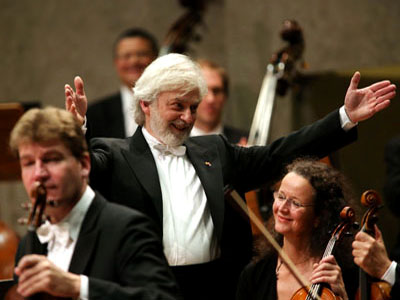
By ANDREW POWELL
Published: November 30, 2014
MUNICH — Along with the whole U.S., this city was on Krystian Zimerman’s “avoid” list. His Bavaria visits would take in Augsburg, Nuremberg, Regensburg, any place but the capital, following a harsh review of a performance he gave a dozen or more years ago. Somehow Munich’s musical life went on without the principled Polish pianist — until this month, when, just like that, he was back, holding Mariss Jansons’ hand for a benefit concert in support of the Süddeutsche Zeitung’s Adventskalender für gute Werke. Perhaps the noble purpose did the trick; the calendar annually raises €5 million for the disadvantaged. Or perhaps it was the tie-in with a two-week East Asia tour, ending today.
The chance to hear Brahms’s D-Minor Concerto (1858) from this long-absent artist appealed widely enough to overfill the Herkulessaal Nov. 5 at benefit prices. Results were gratifying, at least in the grand first movement. Zimerman brought out its rhetoric and delicacy, power and logic. He conveyed passion but preserved clarity and never allowed the brief reflective passages to turn somber. Along the way, his work was braced tightly, flatteringly, by Jansons and the Symphonie-Orchester des Bayerischen Rundfunks on fine form. Then the soloist awkwardly held back the tempo of the Adagio, so that it barely had a pulse. (His 2003 Berlin recording suffers the same fate, but not his 1983 Vienna version.) The Rondo, when it finally came, consequently sounded detached, and, although expertly played, it was taken at a showy pace much beyond allegro non troppo, compounding the estrangement.
Shostakovich’s Fifth Symphony (1937) after intermission typified Jansons’ approach to music: preset, conventional ideas about the score; lavish attention to the realization of those ideas, leaving nothing to the moment; and cultivated support from players long treated as colleagues. The formula has well served him and his much-miked radio orchestra. What was missing at this immaculate performance, as usual, was a sense that the symphony meant something in particular to the conductor, that a uniquely Jansons view might rear its wayward head, and therefore the reading, while never routine, felt ever so slightly like a waste of time.
Photo © Robert Haas for Süddeutsche Zeitung
Related posts:
Levit Plays Elmau
Nézet-Séguin: Hit, Miss
Muti Crowns Charles X
Jansons! Petrenko! Gergiev!
Petrenko Hosts Petrenko
Tags: Bavarian Radio Symphony Orchestra, Brahms, Herkulessaal, Krystian Zimerman, Mariss Jansons, München, Munich, Review, Shostakovich, Süddeutsche Zeitung, Symphonie-Orchester des Bayerischen Rundfunks